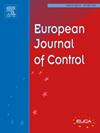Model predictive control of switched affine systems with dwell time constraints—Efficient formulation, approximation and embedded implementation
IF 2.6
3区 计算机科学
Q2 AUTOMATION & CONTROL SYSTEMS
引用次数: 0
Abstract
In this work, we study the problem of designing a model predictive control (MPC) strategy for switched affine systems with dwell time constraints. We show that the task of simultaneous determination of the optimal operational mode and actuator inputs can be formulated within the generalized disjunctive programming (GDP) framework and highlight its computational advantages over traditional techniques. Although GDP provides an efficient parametrization of the associated mixed integer program, the combinatorial nature of the problem might require a large computational time limiting its applicability in real time scenarios. To this end, we propose a framework based on the multitask learning paradigm to approximate the solution of mixed integer MPC for switched affine systems. We also provide a computational method based on the offline solution of a mixed integer linear program to overapproximate the reachable sets of the closed loop system that helps to analyze the safety and stability of the system under the influence of the learned controller. Once trained offline, the resulting controller results in a solver free approach well suited for implementation on a resource constrained embedded hardware. Several illustrative examples are provided to show the efficacy of the proposed approach.
具有停留时间约束的切换仿射系统模型预测控制——高效的公式、近似和嵌入式实现
在这项工作中,我们研究了具有停留时间约束的切换仿射系统的模型预测控制策略的设计问题。我们表明,同时确定最佳运行模式和执行器输入的任务可以在广义析取规划(GDP)框架内制定,并突出其相对于传统技术的计算优势。尽管GDP为相关的混合整数程序提供了有效的参数化,但问题的组合性质可能需要大量的计算时间,限制了它在实时场景中的适用性。为此,我们提出了一个基于多任务学习范式的框架来逼近切换仿射系统的混合整数MPC解。我们还提供了一种基于混合整数线性规划离线解的闭环系统可达集过逼近的计算方法,有助于分析系统在学习控制器影响下的安全性和稳定性。一旦脱机训练,生成的控制器将产生一种无需求解器的方法,非常适合在资源受限的嵌入式硬件上实现。给出了几个说明性的例子来说明所提出的方法的有效性。
本文章由计算机程序翻译,如有差异,请以英文原文为准。
求助全文
约1分钟内获得全文
求助全文
来源期刊

European Journal of Control
工程技术-自动化与控制系统
CiteScore
5.80
自引率
5.90%
发文量
131
审稿时长
1 months
期刊介绍:
The European Control Association (EUCA) has among its objectives to promote the development of the discipline. Apart from the European Control Conferences, the European Journal of Control is the Association''s main channel for the dissemination of important contributions in the field.
The aim of the Journal is to publish high quality papers on the theory and practice of control and systems engineering.
The scope of the Journal will be wide and cover all aspects of the discipline including methodologies, techniques and applications.
Research in control and systems engineering is necessary to develop new concepts and tools which enhance our understanding and improve our ability to design and implement high performance control systems. Submitted papers should stress the practical motivations and relevance of their results.
The design and implementation of a successful control system requires the use of a range of techniques:
Modelling
Robustness Analysis
Identification
Optimization
Control Law Design
Numerical analysis
Fault Detection, and so on.
 求助内容:
求助内容: 应助结果提醒方式:
应助结果提醒方式:


